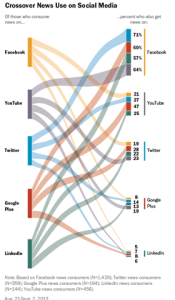
Social Media and News: Amazing Graphic
“News Use across Social Media Platforms” confirms what I have suspected for a while. The mobile generation has some interesting behavior patterns with regard to news. Among the factoids that the Pew outfit has boiled down to numbers are:
ITEM: YouTube viewers are not using the service to get news. Maybe that explains why experiments with Thomson Reuters proved to be somewhat disappointing.
ITEM: Google Plus is less popular than Reddit, Twitter, and Facebook as a source of news. The push back about Google Plus as a prerequisite for YouTube comments may have more importance than some realize.
ITEM: Facebook is an important source of news. As the demographics of Facebook shift, the importance of news may suggest that Facebook has morphed into a more mature service.
The most interesting “fact” in the report is the apparent importance of Reddit, a service which points to public posts on a range of issues. The Reddit service offers a search function, but I find consistently disappointing. In fact, most of the unusual collections of links and comments are essentially unfindable.

Another interesting facet of the report is the inclusion of some trendy graphics. The diagram below is my favorite.
In my opinion, the good news in the report appears in this passage:
Social media news consumers still get news from a variety of other sources and, in some cases, even more so than the general public does. YouTube, LinkedIn and Google Plus news consumers are more likely than Facebook and Twitter news consumers to watch cable news. Twitter news consumers are among the least likely to turn to local and cable TV. And nearly four-in-ten LinkedIn news consumers listen to news on the radio, compared to about a quarter of the general population.
For now, the digital services cannot celebrate total victory. Publishers of traditional news media live to fight another day. For now.
Stephen E Arnold, November 15, 2013
Phi Beta Iota: Most interesting about this graphic is the absence of Wikipedia and the absence of Amazon. Wikipedia continues to have enormous potential, particularly if it develops multi-lingual cross-over capabilities, but Wikipedia is corrupt to the bone. It has been captured by a mix of unethical unprofessional editors and institutional hijacking of pages to the point that Wikipedia is no longer even remotely reliable as a source for any topic where money matters. Amazon continues to be one of the most astonishingly underdeveloped platforms for a world brain able to integrate education, intelligence (decision-support) and research at the dot to dot, dot to person, and person to person level, but Amazon is still lcoked into selling “thinks” rather than relationships or transactions.
See Also:
SchwartzReport: The Decline of Wikipedia



